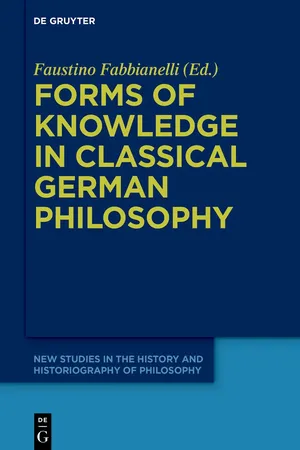
- 310 pages
- English
- PDF
- Available on iOS & Android
eBook - PDF
Forms of Knowledge in Classical German Philosophy
About this book
The volume offers a different image of classical German philosophy with special reference to the topic of forms of knowledge. Concepts like "cognition," "knowing," and "belief" find their explication within different speculative frameworks and are investigated in more and less well-known authors, including but not limited to Fichte, Schelling, Hegel, Fries, Eschenmeyer, and W. Humboldt.
Frequently asked questions
Yes, you can cancel anytime from the Subscription tab in your account settings on the Perlego website. Your subscription will stay active until the end of your current billing period. Learn how to cancel your subscription.
No, books cannot be downloaded as external files, such as PDFs, for use outside of Perlego. However, you can download books within the Perlego app for offline reading on mobile or tablet. Learn more here.
Perlego offers two plans: Essential and Complete
- Essential is ideal for learners and professionals who enjoy exploring a wide range of subjects. Access the Essential Library with 800,000+ trusted titles and best-sellers across business, personal growth, and the humanities. Includes unlimited reading time and Standard Read Aloud voice.
- Complete: Perfect for advanced learners and researchers needing full, unrestricted access. Unlock 1.4M+ books across hundreds of subjects, including academic and specialized titles. The Complete Plan also includes advanced features like Premium Read Aloud and Research Assistant.
We are an online textbook subscription service, where you can get access to an entire online library for less than the price of a single book per month. With over 1 million books across 1000+ topics, we’ve got you covered! Learn more here.
Look out for the read-aloud symbol on your next book to see if you can listen to it. The read-aloud tool reads text aloud for you, highlighting the text as it is being read. You can pause it, speed it up and slow it down. Learn more here.
Yes! You can use the Perlego app on both iOS or Android devices to read anytime, anywhere — even offline. Perfect for commutes or when you’re on the go.
Please note we cannot support devices running on iOS 13 and Android 7 or earlier. Learn more about using the app.
Please note we cannot support devices running on iOS 13 and Android 7 or earlier. Learn more about using the app.
Yes, you can access Forms of Knowledge in Classical German Philosophy by Faustino Fabbianelli in PDF and/or ePUB format, as well as other popular books in Philosophy & Epistemology in Philosophy. We have over one million books available in our catalogue for you to explore.
Information
Topic
PhilosophySubtopic
Epistemology in PhilosophyTable of contents
- Table of Contents
- Abbreviations
- Introduction
- Knowledge and Its Foundation: The “philosophy of pure reason” and Its System in Kant
- Critique and Metaphysics in K. L. Reinhold’s Jena Thought
- The Subject without Contradiction: Being and Becoming in Fichte
- Critical Thinking and Ontology in the Doctrine of Science
- System and Freedom in Young Schelling
- The Relation between Transcendental Philosophy and Philosophy of Nature. The Controversy between Fichte and Schelling
- Kant and Hegel on the Status of Glauben
- “Dos moi pou sto”: Belief as a New Foundation of Knowledge in F. H. Jacobi
- “Sapere aude”. Schiller’s Letters to Prince von Augustenburg and Kant’s Answer to the Question: What Is Enlightenment?
- From Kant to Humboldt: A ‘Reform’ of Humanity’s Way of Thinking and Spiritual Education
- Schopenhauer and German Idealism
- The Primacy of the Practical from Fichte to Schopenhauer
- Content and Object of Critical Cognition: Jakob Friedrich Fries’ Evaluation of Reinhold’s and Fichte’s Philosophy
- At the Limits of Experience: A Dialogue on Philosophy and Religion between Eschenmayer and Fries
- Critical Reason and “unübertragbare” Historicity: Schleiermacher and the Post-Kantian Philosophical Context
- Index of persons